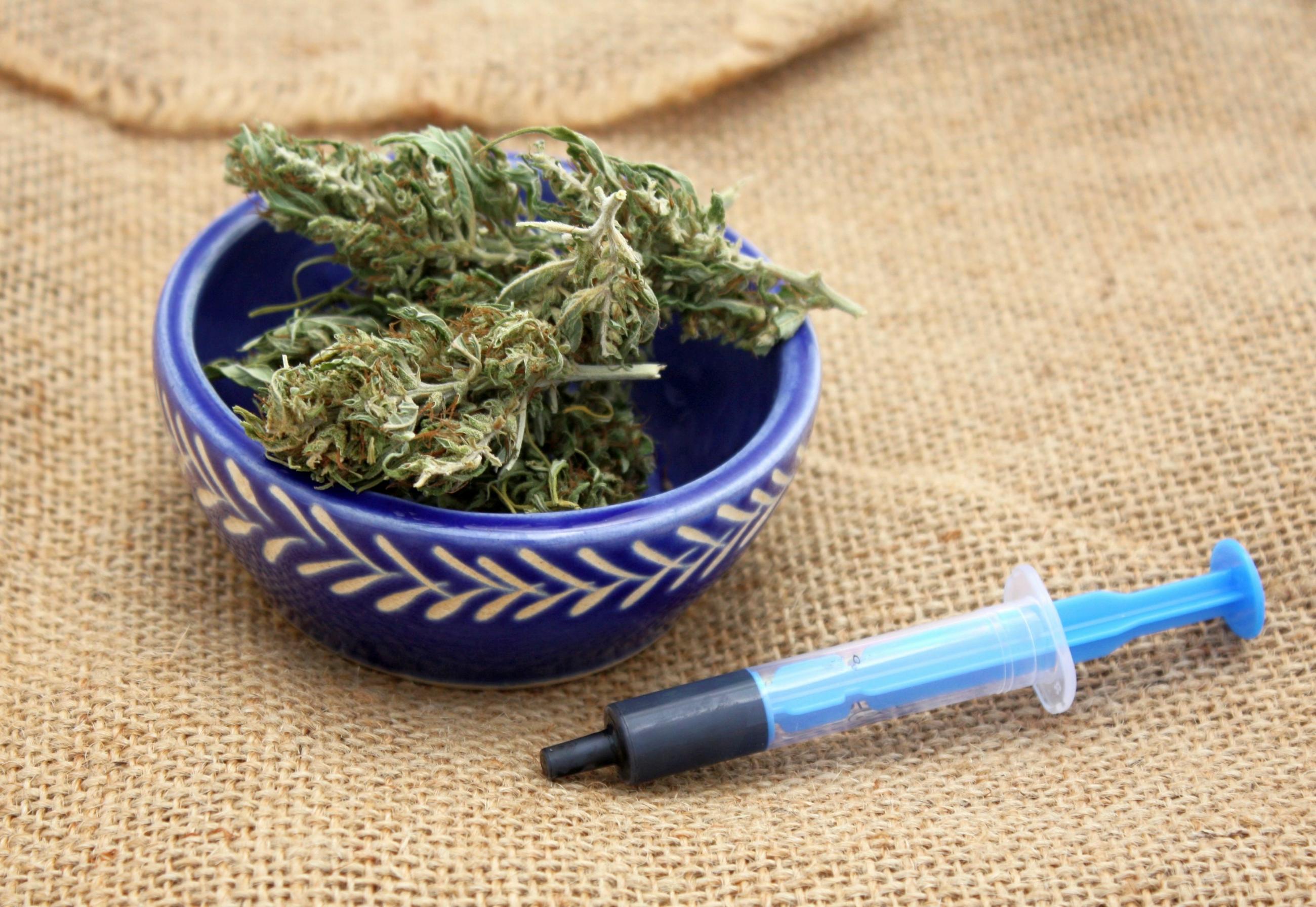INTRODUCTION
Rick Simpson oil (RSO) is a highly potent, dark brown/black oil made from the flowers of the cannabis plant. RSO contains numerous healing compounds and is unusually high in tetrahydrocannabinol (THC). RSO’s namesake is Rick Simpson, a Canadian scientist and medical cannabis activist. When suffering from skin cancer, Simpson created a cannabis oil (known today as RSO), applied it to his skin, and days later, his cancer spots were reportedly gone. There is some early research suggesting that RSO and other forms of cannabis can help with cancer treatment, but more conclusive evidence regarding its safety and effectiveness in humans is necessary.
WHAT IS RSO?
With regards to the meaning of RSO, Rick Simpson oil is a high-potency cannabis extract, unique due to its high levels of THC. In states with legalized medical and/or recreational marijuana, RSO can be found at cannabis dispensaries. Simpson details how to make RSO on his website.
WHAT AILMENTS IS RSO USED FOR?
Modern research has shown that RSO may be able to help with cancer treatment, in conjunction with other therapies. There is evidence that cannabis oils containing THC can help with nausea and vomiting from chemotherapy, treat pain, and improve appetite. Early studies on using THC to treat cancer have been very promising, but research has not shown that RSO or other forms of cannabis oil can directly treat cancer in humans. Research on animals has shown that THC can potentially stop the growth of tumors, stop the cancer cells from spreading, and may even kill off cancer cells.
Although there is not an immense amount of direct evidence, RSO has also been shown to be effective with treating other conditions, including:
- Arthritis
- Asthma
- Chronic inflammation
- Depression
- Drug addiction
- High blood pressure
- Infections (e.g., MRSA)
- Inflammation
- Insomnia
- Multiple sclerosis
HOW RICK SIMPSON OIL WORKS
RSO is an oily concentrate that comes from separating the plant’s cannabinoids and plant material, meaning the resin and trichomes are separated from the plant. RSO has some similarities to hash oil and other cannabis concentrates, but it tends to have higher levels of THC than regular cannabis oil, making it more potent. Some research shows that this strong combination of highly concentrated cannabinoids and terpenes can treat medical conditions such as cancer by “soaking” cells with cannabinoids, thus fighting cancerous cells.
In a study published in the National Library of Medicine titled “Cannabis Extract Treatment for Terminal Acute Lymphoblastic Leukemia with a Philadelphia Chromosome Mutation,” RSO appeared to help reduce a child’s specific type of cancer. However, she passed away from unrelated complications, making it difficult to assess RSO’s long-term effectiveness. More research on the subject is necessary before conclusions can be drawn.
HOW TO USE RSO
In states where medical and/or recreational marijuana is legal, numerous companies sell RSO on the market, but Rick Simpson’s website recommends that you make it at home. It is recommended to use an indica strain, drawing on its relaxing properties to help with healing. Generally, to make RSO, one must mix highly purified alcohol with cannabis, strain the solvent to remove extra plant material, and heat the solvent (while avoiding naked flames) to remove the alcohol and additional contaminants. This produces a thick, sticky oil that can be used in numerous ways. It is important to note that making RSO at home can be dangerous and illegal in many areas. More details on how to make RSO safely can be found on Rick Simpson’s website.
With regards to RSO dosing, everyone has a different ideal dose, but it is recommended to start with 60 grams over 90 days. Patients should start with three doses per day of a very small drop, then double their dose every four days. After approximately five weeks, it is recommended to up one’s dose to a gram per day until finishing all 60 grams.
It is recommended to ingest RSO or use it topically. If smoking or vaping, it is important to make sure the particular oil is correct, and all alcohol is burnt off. Smoking or vaping can be dangerous and combustible, making ingestion or topical use the preferred methods. It is important to note that edibles made with RSO can be extremely strong, so one must be careful with dosing. Try our cannabutter recipe and adjust the dosing to account for RSO’s high THC concentration.
BENEFITS AND RISKS OF USING RSO
There are numerous CBD and THC differences, but just like how there are many CBD oil benefits, the high THC concentration of RSO has its own benefits as well. Potential benefits of using RSO include help treating arthritis, asthma, chronic inflammation, depression, drug addiction, high blood pressure, infections (e.g., MRSA), inflammation, insomnia, and multiple sclerosis. Individuals may also use RSO for pain, nausea, loss of appetite, and other complications of these conditions.
However, it is important to note that there is little evidence to suggest RSO directly cures cancer, so patients are advised to continue their recommended medical treatment.
Potent doses of THC can have numerous side effects, including:
- Accelerated heart rate
- Anxiety
- Coordination problems
- Delayed reaction times
- Difficulty sleeping
- Disorientation
- Dizziness
- Dry, red eyes
- Fatigue
- Hallucinations
- Headaches
- Impaired memory
- Irritability
- Low blood pressure
- Mood swings
- Nausea/vomiting
- Panic attacks
- Paranoia
These side effects are usually temporary. However, some research suggests that THC may pose long-term risks, such as impaired thinking, especially in younger users.
Due to RSO’s high potency, overconsumption can lead to serious side effects, such as tachycardia and paranoia.
Individuals should not drive or operate heavy machinery while using RSO.
Making RSO at home is illegal in some places and is potentially dangerous.
If taking other medications, it is recommended to be aware of potential drug interactions with RSO. Medications with potentially negative interactions include antidepressants, opioids, sedatives, and more.
CONCLUSION
Early research suggests that cannabis may be able to help treat cancer, but this research is not conclusive, and there is no solid evidence showing that RSO can cure cancer directly. Scientists must conduct additional research in humans regarding the short-term and long-term effects of RSO before they can draw firm conclusions. Anyone interested in using RSO or other cannabis oil for cancer should speak with their marijuana doctor and medical doctor before beginning this treatment.
FAQ
What is RSO good for?
Early evidence suggests RSO may be able to help treat cancer and other conditions, such as arthritis, asthma, chronic inflammation, depression, drug addiction, high blood pressure, infections (e.g., MRSA), inflammation, insomnia, and multiple sclerosis. Individuals may also use RSO for pain, nausea, loss of appetite, and other complications of these conditions.
Where to buy Rick Simpson oil?
In states with legalized medical and/or recreational marijuana, RSO can be found at cannabis dispensaries. It can also be made at home, but safety precautions must be taken.
How to use RSO?
In states where RSO is legal, patients can purchase it at a dispensary or make it at home (if safely following detailed instructions). Everyone has a different ideal dose, but it is recommended to start with 60 grams over 90 days. It is recommended to ingest RSO or use it topically.
























